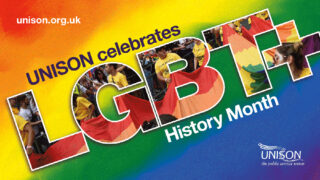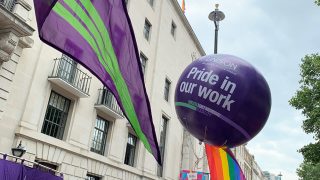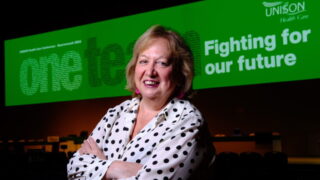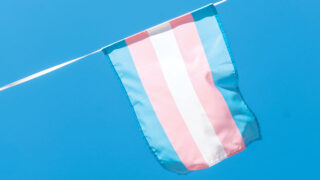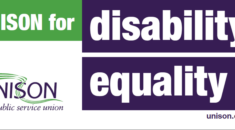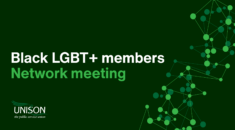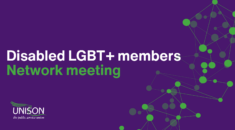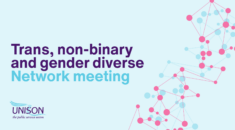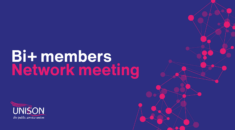When Phillippa Scrafton sat her boss down and told him she was having gender reassignment treatment she watched “the colour drain from his face”.
Born male but never feeling right in that gender, she suppressed those feelings for 35 years. But a decade ago, when children were on the cards, it became unbearable.
It was, she says, a choice between suicide or becoming the person she knew she was.
UNISON’s self-organised groups exist to fight for equality and to support workers experiencing prejudice – in work and out.
Phillippa is Darlington Borough Council’s recycling and waste minimisation officer and spends her days managing a team of bin men.
She’s also the warm, upbeat co-chair of the union’s transgender caucus, and has blazed a trail for transgender equality.
Ten years ago, she chose life. The first stage of that journey was telling loved ones. That meant a painful divorce and mixed reactions from her family.
Her mother and twin brother were kind and supportive, but her father said: “I hope you die before I do.” They haven’t spoken since.
Then Phillippa had to tell her UNISON colleagues, and circumstances led her to do it in a rather memorable way.
LGBT – A huge step forward
Having been a UNISON rep for over 15 years as a man, and having only told around a dozen people about her gender reassignment at that point, Phillippa took to the stage at national delegate conference (NDC) and told 3,000 trade unionists that she was transgender.
Until then, UNISON’s LGBT group didn’t exist. The lesbian and gay self-organised group had agreed the previous year that it should be replaced by an LGBT group, but this needed a rule change at NDC.
Phillippa was speaking in favour of changing the rules to make that happen.
Along with the hard work of other campaigners, transgender and bisexual members, she helped persuade the hall – and the LGBT group was born.
It was a huge step forward for transgender and bisexual rights in the union, but Phillippa’s journey had barely begun.
When it came to telling her employer, she was petrified that they would remove her from her front-facing role and “hide me in the basement”.
She wanted to know what her rights were and be reassured that they couldn’t sack her or make her life so difficult that she’d leave, but information was sparse.
Despite this, she saw the funny side. “I put it to them like this: ‘I’m the recycling officer – I’m just recycling myself!’”
As it turned out there was no threat. Her managers were not the problem.
Before people have irreversible gender reassignment treatment, they are required to spend a period of time in what’s known as the ‘real-life experience’, living 24/7 as the gender they feel is right.
The morning of her first day in the office as a woman, Phillippa pulled up in the office car park, but couldn’t move. She sat in her car for 45 minutes, not daring to get out. A kind colleague brought her a cup of tea.
Not all were so sympathetic. One colleague placed porn in her car. Another wrote a letter to the Northern Echo, calling her a ‘thing’ and saying she shouldn’t be allowed to work for the council.
The newspaper didn’t print it, but the writer pinned it to the notice board in the canteen and stuck it to her colleagues’ car windscreens.
The Equality Act 2010 (England, Scotland and Wales) protects against discrimination because of gender reassignment in employment and service delivery, and covers all sizes and types of employer and all types of worker. There is similar protection in Northern Ireland under the Sex Discrimination (Gender Reassignment) Regulations (NI) 1999.
Phillippa’s workplace handled the situation well: the bullies were disciplined and one dismissed.
Today, UNISON’s LGBT group works to improve the workplace experience of members transitioning by collecting best-practice examples of how managers can support transitioning employees.
They pass this, together with legal information and practical advice, to LGBT and equality reps and stewards across the country.
Each journey is different
Dave Merchant, a business intelligence researcher and analyst at Oldham council and current co-chair of the transgender caucus, says that each transgender person’s journey is different.
Some like to inform colleagues individually, others like management to tell everyone. The main thing is that employers are supportive and listen to the needs of their employees.
Changing gender can take years, during which people need support in work and out.
Phillippa says how lucky she was to have the committed support of her mother, who came with her to every appointment – even ones at her gender clinic in Edinburgh.
Her mother was there when a group of people on her estate began a campaign of harassment, smashing her windows, spray-painting ‘tranny’ on her flat and smearing dog mess on her window.
One evening, as she was returning home from an LGBT event at a local arts centre, a group appeared, taunted and attacked her. Phillippa was beaten unconscious, though if people had not come out of a pub to stop it, it could have been worse.
After that, her confidence sank; she kept her blinds shut and didn’t like to leave the house.
Because of discrimination, transgender people are at greater risk of depression, self-harm and suicide. A 2007 survey of trans people found that 34% had considered killing themselves.
But she told herself: “I will not lose, I will not be beaten down.” And with each new step towards becoming female, she felt more herself.
Phillippa is happy to answer curious people’s questions, and laughs when she tells me how often she’s asked which toilet she uses. “If I had a pound for every time someone asked me that, I’d be rich.”
She credits the people she met at UNISON for getting her through this period in her life, saying: “I honestly don’t think I’d be here today if it wasn’t for the LGBT group.”
A growing network
Today, lesbian, gay, bisexual and transgender members are all active at branch, regional and national level. A growing network of LGBT reps supports members in branches, discusses local terms and conditions, supports individual LGBT members with issues at work and debates issues affecting the LGBT community.
Twelve regional LGBT groups meet regularly, arrange training for activists, campaign for LGBT equality and work with other groups in UNISON. Nationally, the LGBT committee works with the national executive council and service groups.
And LGBT groups around the UK organise recruitment drives each year to build the union for everyone.
Phillippa chaired the first LGBT conference after the historic founding in Glasgow, and today she is the LGBT rep for the Northern region.
She’s also a Stonewall role model and has spoken at that organisation’s national conference; she’s chair of an LGBT charity in Darlington and sits on an independent advisory board for the police on behalf of an LGBT group.
And she’s still Darlington council’s full-time recycling and waste minimisation officer.



